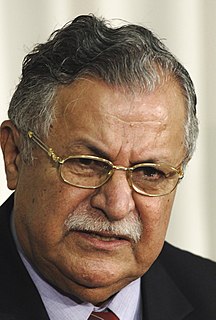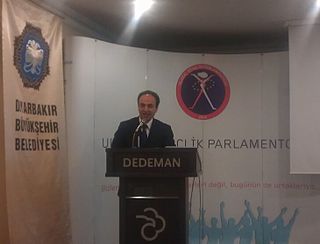A Quote by Andrew Mango
We've seen in Europe after the recent terrorist attacks a certain retrogression in human rights. It depends on how threatened the Turks feel. For example, Turkey became much more tolerant towards Kurdish nationalists when the killing of Turkish soldiers stopped in southeastern Turkey and body bags stopped arriving. Now, since June there's been a revival of Kurdish attacks on Turkish troops - something like 150 people have been killed by terrorists supplied from and operating out of bases in northern Iraq. So Turks are feeling much less tolerant of Kurdish nationalism.
Quote Topics
After
Arriving
Attacks
Bags
Bases
Became
Been
Body
Certain
Depends
Europe
Example
Feel
Feeling
For Example
How
Human
Human Rights
Iraq
June
Killing
Kurdish
Less
Like
More
Much
Nationalism
Northern
Now
Operating
Out
People
Recent
Revival
Rights
Seen
Since
Soldiers
Something
Stopped
Terrorist
Terrorist Attack
Terrorist Attacks
Terrorists
Threatened
Tolerant
Towards
Troops
Turkey
Turkish
Turks
Related Quotes
There was a time when Istanbul was one of the safest cities in the world, because people were afraid of the police. People are no longer as afraid of the police as they used to be. Mugging used to be almost unknown; now everybody is afraid of mugging. In that sense, the downside of liberalization is already being felt in Turkey. And of course some people are afraid of Kurdish ethno-terrorism, which worries Turks very much more than the religious sort.
Most Turkish Kurds want a quiet life and improved economic conditions. But the Kurdish regions of Turkey are mountainous; they're ill-favored climatically; they're poor; and there's a limit to what the government can do there without wasting a lot of resources. Developing the south east may mean decamping a large part of its population. But the thing that will improve the lot of the Kurds more than anything else will be the stabilization of Iraq in the first place, because then the Turkish southeast stops being a dead end. It can become a bridge, with trade flowing in both directions.
So many academics have been imprisoned or expelled from their university posts just because they signed a letter calling for peaceful solution to the Kurdish issue. They are all declared enemies of the state by the president. Just because they published a letter saying, "stop killing each other and begin talking for a peaceful resolution." That kind of intolerance from the government towards the rest of society - especially people in favor of freedom of speech, human rights, and more democracy for everyone - is a very important issue in Turkey.
In recent years the military has gradually been eased out of political life in Turkey. The military budget is now subject to much more parliamentary scrutiny than before. The National Security Council, through which the military used to exercise influence over the government is now a purely consultative body. But Turkish society still sees the military as the guarantor of law and order. The army is trusted, held in high regard - though not by dissident liberals. When things go wrong, people expect the military to intervene, as they've intervened over and over again in Turkish history.
The problem of ISIS is not recent. Ever since the Second World War, people in this region have been, and are today, living under brutal dictatorships governed by nationalistic fervor. As for the Kurdish question: nobody from the Arab world is serious about fighting ISIS. It's only the Kurdish people who are standing firm against ISIS. And I think Europe, the United States, and most other democratic countries of the world are beginning to look at the Kurds in another way. The Kurds are really becoming their partners in the region.
Istanbul and the western and southern seaboards are very Europeanized. But then you have the Kurdish areas, in the southeast. That's Turkey's Middle East, where you have a different society, which itself is changing but much more slowly, where women are maltreated, are expected to have huge families, and are often basically beasts of burden. That is changing - with education, with the movement of people from the southeast to the west and the cities. As with so much in Turkey, you can't expect change to happen overnight.
By very conservative estimates, Turkish repression of Kurds in the 1990s falls in the category of Kosovo. It peaked in the early 1990s; one index is the flight of more than a million Kurds from the countryside to the unofficial Kurdish capital, Diyarbakir, from 1990 to 1994, as the Turkish army was devastating the countryside.
How did the Turks become Muslim? They became Muslim through the Sufis. The Arabs never conquered the Turks. There were people in early Islam who were speaking like Hallaj, who spoke about the Truth, about reaching the Truth, about being one with the Truth, and not only they were not killed, but they were great heroes of their own culture, and there is a university in Turkey named after one [Sufi Saint.]
Since terrorists are pouring into Iraq in response to calls from international terrorist networks, the number of those who are killed is especially important, for these are people who will no longer be around to launch more attacks on American soil. Iraq has become a magnet for enemies of the United States, a place where they can be killed wholesale, thousands of miles away.




























